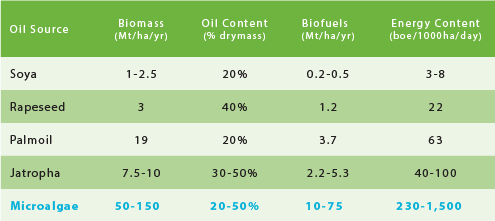Algae Will Help Meet the Growing Demand for Biofuels for Transporation and Energy
Breaking News: Cellana and Neste Oil Enter Into Multi-Year, Commercial-Scale Off-Take Agreement for Algae Oil Feedstock for Biofuels

The need for an alternative to fossil fuels has never been more apparent than today, and algae may provide and important part of the solution.
Demand for biofuels has risen dramatically over the past decade due to the converging forces of crude oil cost, ongoing environmental and sustainability issues, and national energy security. The transportation fuel requirements in the U.S. alone are equivalent to greater than 150 billion gallons of biofuel per year. And long-term demand will continue to outstrip production capacity.
Microalgae Provide a Cost-effective and More Sustainable Supply of Oil
Algal biomass consists of natural oils, proteins, and carbohydrates. Many species of algae can produce oils comprising up to 35% or more of their dry weight. Oil produced from algae is very similar in structure to oil derived from plants and vegetables such as soy, palm, and rapeseed. Oils, along with fats, are composed of triglycerides–three fatty acids attached to a glycerol. Normally oils are liquid at room temperature and fats are solid.
Because algae oil is comprised of triglycerides and other fatty acids, it can be converted to a variety of fuel-related products, including biofuels such as renewable diesel, biodiesel, and renewable jet fuel, through the same processes used to convert vegetable oils, animal fats, and other oils. For example, transesterification of vegetable oil to biodiesel is essentially identical to that of transforming algae oil to biodiesel. Alternatively, the feedstock oil derived from algae can be hydro-treated to produce bio-alkanes such as renewable diesel, renewable gasoline, JP-8, and other jet fuels.
Oil accumulation in algae typically occurs during periods of environmental stress, including growth under nutrient-deficient conditions. In the open-pond growth phase of Cellana’s algae production system, we purposely create a nutrient-deficient environment in order to maximize oil production.
Algae Offer Many Advantages Over Traditional Oilseed Crops Such as Corn, Soybeans or Rapeseed
The table below provides an analysis of the composition and energy potential of terrestrial, first-generation energy crops versus compared to the next-generation energy crop, microalgae.
The advantages of algae include over traditional terrestrial oilseed crops include:
Transportation Fuels
Renewable Diesel

Cellana has recently announced that it has entered into a multi-year off-take agreement with Neste Oil, the world’s leading supplier of renewable diesel, for commercial-scale quantities of Cellana’s ReNew™ Fuel algae oil feedstocks for biofuel applications. Learn more.
Biodiesel

Biodiesel is derived from renewable resources such as vegetable oils, animal fats, or algae oils. It can be used as a pure fuel or blended with petroleum-based diesel (e.g., B5, B10, B20, B100). Blends of 20 percent biodiesel with 80 percent petroleum diesel (B20) can generally be used in unmodified diesel engines. Algae oil can easily be converted to biodiesel through the same technology used to convert the oil from oil seeds to biodiesel, namely, transesterification.
Biodiesel has many advantages:
Jet Fuel from Algae Oil

The need for an alternative to fossil fuels has never been more apparent than today, and algae may provide and important part of the solution.
Demand for biofuels has risen dramatically over the past decade due to the converging forces of crude oil cost, ongoing environmental and sustainability issues, and national energy security. The transportation fuel requirements in the U.S. alone are equivalent to greater than 150 billion gallons of biofuel per year. And long-term demand will continue to outstrip production capacity.


